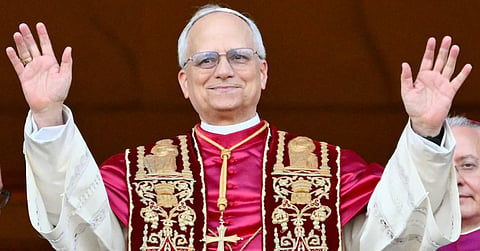
- LIFESTYLE
- FASHION
- FOOD
- ENTERTAINMENT
- EVENTS
- CULTURE
- VIDEOS
- WEB STORIES
- GALLERIES
- GADGETS
- CAR & BIKE
- SOCIETY
- TRAVEL
- NORTH EAST
- INDULGE CONNECT

The bells have rung in St Peter's Square as cardinals have successfully elected a successor to Pope Francis. Robert Prevost, who will take the papal name Pope Leo XIV, has become the first North American pope.
Pope Leo appeared on the central balcony of St. Peter's Basilica approximately 70 minutes after white smoke emanated from a chimney above the Sistine Chapel, signaling that the 133 cardinal electors had selected a new leader for the 1.4 billion-member Catholic Church.
The selection of Prevost was announced by French Cardinal Dominique Mamberti, who declared "Habemus Papam" (We have a pope) in Latin to the tens of thousands assembled in St. Peter's Square to hear the announcement.
A Vatican insider commented: “He was not one of the obvious candidates, but he knows everybody, he spent 30 years as a missionary, he speaks several languages. ‘His time in Peru means he is one of the least ‘American’ of the American cardinals. But he understands America and he can speak to the country, which is important in the Trump era.’”
Cardinal Prevost, 69, was born in Chicago and has an impressive background. He spent years in Peru, initially as a missionary and later as an archbishop. He is viewed as a reformer in the style of Pope Francis, who appointed him to lead the diocese of Chiclayo, Peru, in 2014.
Prevost became so fond of Peru that he obtained Peruvian citizenship in 2015. He led that diocese until 2023, when Francis brought him to Rome to oversee the Vatican’s Dicastery for Bishops, responsible for vetting nominations for senior clergy worldwide.
He also served as president of the Pontifical Commission for Latin America, maintaining regular contact with the region’s Catholic hierarchy, which remains home to the largest Catholic population.
Though he maintained a relatively low profile in Rome, he was involved in one of Pope Francis’ most significant reforms: adding three women to the voting bloc that decides which bishop nominations are forwarded to the pope.
Prior to his election, there was concern that his relatively young age might work against him, as cardinals may have been hesitant to elect a pope whose reign could last twenty years or more.
However, these concerns appear to have been dismissed by most of the cardinal electors, who have now chosen the first American pope, marking a historic shift for the Catholic Church.